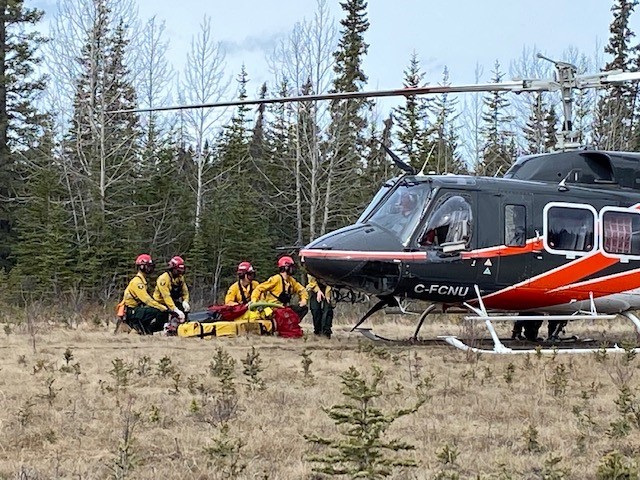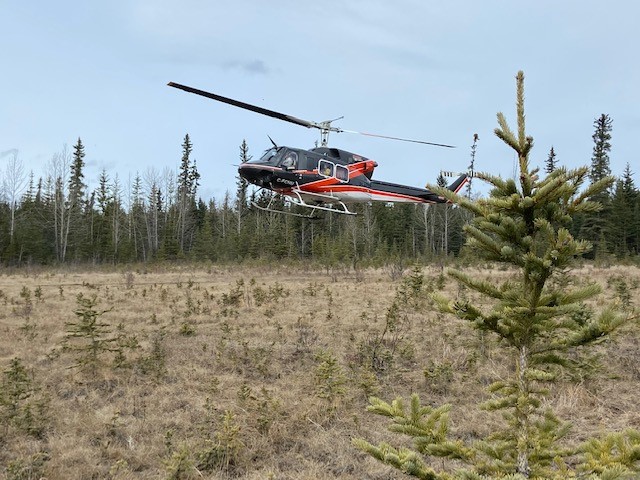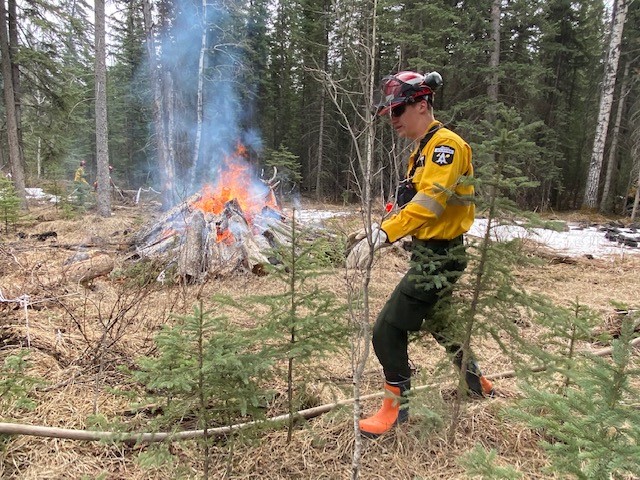After days of classroom training, a new group of wildland firefighting recruits are putting their skills to the test at Alberta’s wildfire training centre in Hinton, Alta.

“We’re going to be testing the skills that they’ve learned in the classroom, separately throughout the week, and putting it all into a scenario that resembles what a real wildfire will look like,” Alberta Wildfire information officer Josee St-Onge said.
On Monday, members of the media were invited to tag along to a training exercise, involving staged fires in the forest, to see what it takes to fight a wildfire. About 45 recruits and trainers took part.

“So they’ll be coming to this site in a helicopter, grabbing their gear for a staged wildfire where they’ll practise setting up pumps, setting up hoses, extinguishing the perimeter of a fire and checking for hot spots in a way that mimics what a real wildfire looks like,” St-Onge said.
The training involves every aspect of firefighting, even including learning how to get in and out of a helicopter safely, as in the case of Helitack crews, which are usually the first firefighters at the scene of a wildfire and primarily work to contain it.


“These are all new recruits that have never worked as firefighters,” St-Onge said. “A lot of our movements happen by helicopter so that’s what they’re practising today — getting out of the helicopter safely, unloading their gear, bringing it to the right location. They are broken up into smaller groups to mimic what our crews look like.”
“We’re using toilet paper to simulate the perimeter of the fire,” said Kyle Fitzpatrick, a wildfire training specialist. “The bonfire is simulating what would happen in the centre of a wildfire if it had an opportunity to sit for a couple hours.”

Get daily National news
The recruits will also learn how to operate the tools and machinery needed to fight fires.
DeeDee Schultz, a Helitack member, previously worked as a dispatcher in Calgary and said she signed up last year and has found her new career very rewarding.
“It’s very exciting to be the first on scene,” Schultz said. “At first, I was very nervous, but once we got into it, it was exciting. We took our time so we could understand everything that we were doing.”
Once her training is complete, Schultz said she will be working out of the Whitecourt forest protection area.
The year, St-Onge said there is more emphasis on nighttime firefighting.
“Generally at night fire behaviour is subdued because it’s cooler and there’s more humidity. We want to take more advantage of that downtime to keep working on the wildfires,” St-Onge added. “We want to take advantage of that time when fires have lower activity so we can make progress.”
The province will also be using three helicopters outfitted with night vision capabilities to fight fires this year.
“They can drop buckets of water and they can use their night vision goggles to see where there are hot spots,” St-Onge said.
Once the firefighters complete their training, they will continue to learn on the job with an experienced firefighting mentor.

The province says it’s on track to have 800 firefighters in place for this wildfire season, plus 300 seasonal staff members.
Alberta Wildfire says about 50 per cent of its staff are returning for another season, leaving another 50 percent, or about 400, to be trained.
“We are gearing up for what could be a challenging season. Right now the conditions are dry and warm. There’s not much snow,” St-Onge said. “We are expecting the northwest part of the province to experience the highest fire danger.
“Right now we’re at a critical time in the spring where the amount of rain that we get is going to make a huge difference.”
Albertans interested in signing up to help fight fires in their area are being invited to do so this season by completing a form on the province’s website. The volunteers must undergo safety training. The province is especially interested in residents experienced with using heavy machinery.
Alberta’s wildfire season officially began on March 1.
The training of new firefighting recruits will continue through the month of April.








Comments
Want to discuss? Please read our Commenting Policy first.